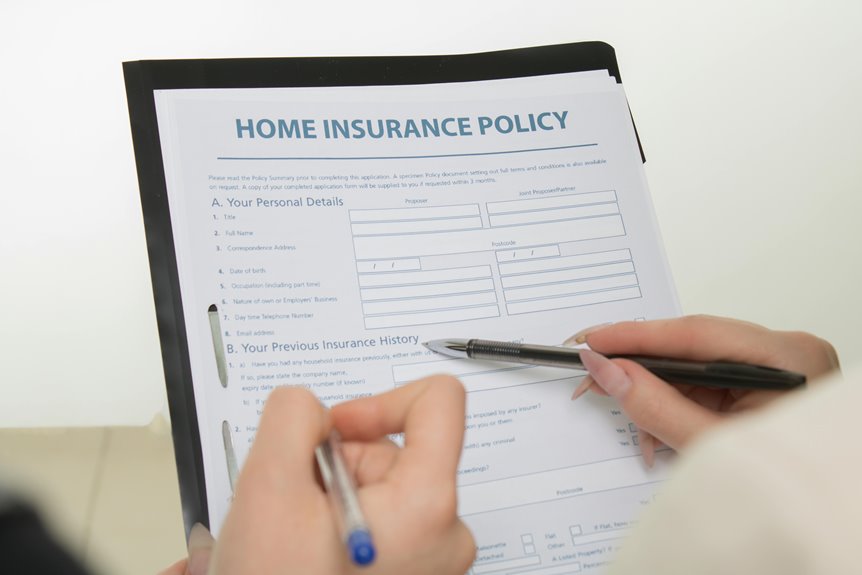As a freelancer, you actually need several types of insurance to protect your business. Start with General Liability Insurance to cover third-party claims. Professional Liability Insurance is essential for safeguarding against errors in your services. Don’t overlook Health Insurance options tailored for freelancers, and consider a Business Owner’s Policy to bundle coverage. Workers’ Compensation is important if you face job-related injuries, while Equipment and Property Insurance protects your valuable tools. Explore more options to guarantee you’re fully covered.
Table of Contents
Key Takeaways
- Freelancers should consider General Liability Insurance to protect against third-party claims and property damage during their work.
- Professional Liability Insurance is essential for covering errors and omissions, safeguarding finances from client-related claims.
- Workers’ Compensation Insurance is crucial for covering medical expenses and lost income due to work-related injuries.
- Equipment and Property Insurance protects valuable assets, such as computers and tools, from theft and damage.
- Additional coverage options like Cyber Liability Insurance can safeguard against data breaches and cyber threats affecting freelance operations.
Understanding the Importance of Insurance for Freelancers
While freelancing offers flexibility and independence, it also comes with unique risks that can leave you vulnerable. You might think you’re safe working from home or managing your own schedule, but unexpected challenges can arise.
Clients may dispute your work, or equipment malfunctions could disrupt your projects. Without adequate insurance, these situations can lead to financial strain or even the loss of your business.
Understanding the importance of insurance is crucial for protecting your livelihood. It not only safeguards your income but also provides peace of mind, allowing you to focus on your craft.
General Liability Insurance
As a freelancer, you need to contemplate how general liability insurance can safeguard your business.
This coverage protects you against third-party claims and helps you manage the financial risks that come with property damage.
Coverage for Third-Party Claims
General liability insurance is essential for freelancers, ensuring you’re protected against third-party claims that may arise during your work.
Whether you’re a graphic designer, writer, or consultant, accidents can happen, and clients may hold you responsible for damages or injuries. This coverage helps shield you from legal fees, settlements, or judgments that could greatly impact your finances.
For instance, if a client trips over your equipment and sustains an injury, they might file a claim against you. With general liability insurance, you won’t have to bear the financial burden alone.
It gives you peace of mind, allowing you to focus on your projects without constantly worrying about potential lawsuits. Investing in this coverage is a smart move for your freelance career.
Protection Against Property Damage
Accidents can happen, and when they do, having protection against property damage is essential for freelancers. General Liability Insurance helps safeguard your business from unexpected mishaps that can lead to costly repairs or legal fees.
For instance, if you accidentally damage a client’s property while on-site, this insurance can cover the expenses, preventing you from bearing the full financial burden.
Additionally, it protects you from claims related to bodily injury or property damage that may occur due to your work.
By investing in this coverage, you’re not just protecting your assets; you’re also enhancing your credibility with clients. It shows you take your business seriously and are prepared for unforeseen challenges.
Don’t overlook this vital aspect of your freelance protection plan.
Professional Liability Insurance
As a freelancer, you need to protect yourself from potential claims your clients might make against you.
Professional liability insurance covers errors and omissions, ensuring you’re financially secure if a project doesn’t go as planned.
It’s an essential safety net that can save your business from costly setbacks.
Coverage for Errors Omissions
When you provide professional services, the risk of making mistakes or overlooking important details is always present, which is why having Errors and Omissions (E&O) insurance is essential. This insurance protects you from claims related to negligence, errors, or omissions in your work. It can cover legal fees, settlements, and judgments, ensuring you’re not financially burdened by unexpected claims.
Here’s a quick comparison of E&O insurance features:
| Feature | Description |
|---|---|
| Coverage Scope | Errors, omissions, and negligence |
| Legal Defense Included | Yes, covers attorney fees |
| Peace of Mind | Protects your financial stability |
Investing in E&O insurance is a smart decision that safeguards your freelance business.
Protecting Against Client Claims
While E&O insurance protects you from claims related to mistakes in your work, professional liability insurance takes it a step further by covering a broader range of client claims.
This type of insurance safeguards you against allegations of negligence, misrepresentation, or failure to deliver services as promised. If a client feels dissatisfied with your work or claims you didn’t meet their expectations, this coverage can help defend you in court and cover legal fees.
It’s essential for freelancers in creative fields, consulting, or any service-based industry where your work’s interpretation can vary. Without it, a single claim could jeopardize your finances and reputation.
Protect yourself and your business by investing in professional liability insurance today.
Health Insurance Options for Freelancers
Finding suitable health insurance options is crucial for freelancers, especially since they often lack the benefits provided by traditional employment.
You have a few choices to reflect on. First, you can explore the Health Insurance Marketplace, where you’ll find various plans tailored to your needs and budget.
Another option is joining a professional organization that offers group health insurance, which might provide better rates.
If you’re healthy, a high-deductible health plan paired with a Health Savings Account (HSA) could be a smart choice, allowing you to save for medical expenses tax-free.
Finally, don’t forget to check for any state-specific programs that might offer assistance or unique coverage options for freelancers.
Taking the time to research guarantees you find the right fit for your situation.
Business Owner’s Policy (BOP)
As you navigate the complexities of freelance work, securing a Business Owner’s Policy (BOP) can provide essential protection for your business assets. A BOP typically combines general liability insurance and property insurance, making it a cost-effective solution for freelancers.
Here’s a quick breakdown of what a BOP covers:
| Coverage Type | Benefits |
|---|---|
| General Liability | Protects against third-party claims |
| Property Insurance | Covers business property loss |
| Business Interruption | Reimburses lost income during disruptions |
| Equipment Breakdown | Covers repair costs for damaged equipment |
Cyber Liability Insurance
In today’s digital landscape, nearly 60% of small businesses experience cyberattacks, making Cyber Liability Insurance an essential consideration for freelancers. This type of insurance protects you against data breaches, hacking incidents, and other cyber threats.
If you handle sensitive client information or financial data, you’re particularly vulnerable. Cyber Liability Insurance can cover costs related to data recovery, legal fees, and even notifications to affected clients.
Handling sensitive client information makes you vulnerable; Cyber Liability Insurance covers data recovery, legal fees, and client notifications.
Without it, a cyber incident could lead to significant financial losses and damage your reputation. Assess your specific risks and consider how much coverage you need based on your client base and the nature of your work.
Investing in this insurance not only safeguards your business but also builds trust with your clients.
Workers’ Compensation Insurance
While you may think of yourself as a solo operator, accidents can happen, and that’s where Workers’ Compensation Insurance comes into play. This type of insurance protects you from financial strain if you’re injured while working. It covers medical expenses and lost wages, allowing you to focus on recovery instead of finances.
Here’s a quick look at some benefits:
| Benefit | Description |
|---|---|
| Medical Coverage | Pays for hospital and treatment costs |
| Wage Replacement | Compensates for lost income |
| Rehabilitation Services | Assists in recovery and job retraining |
| Legal Protection | Shields against lawsuits |
| Peace of Mind | Reduces stress during recovery |
Investing in Workers’ Compensation Insurance is a smart move for your freelancing career.
Equipment and Property Insurance
Accidents don’t just happen to people; they can also affect your gear. As a freelancer, your equipment is your lifeline, whether it’s a laptop, camera, or specialized tools.
Equipment and property insurance protects your valuable assets against theft, damage, or loss. Imagine your laptop getting stolen right before a big deadline. Without coverage, replacing it can hit your wallet hard.
This insurance not only covers physical items but can also include liability for any damage you cause to property while working. It’s vital to assess the value of your equipment and choose a policy that meets your needs.
Frequently Asked Questions
Do Freelancers Need Insurance if They Work From Home?
Imagine your home office becoming a stormy sea. You might think you’re safe, but freelancers need insurance, even when working from home. It protects you from unexpected waves like liability claims or equipment damage.
How Can Freelancers Save on Insurance Costs?
You can save on insurance costs by comparing quotes, bundling policies, increasing deductibles, and seeking discounts for being claims-free. Regularly review your coverage needs to make certain you’re not over-insured or paying for unnecessary extras.
What Coverage Is Essential for Gig Economy Workers?
As a gig economy worker, you’ll want essential coverage like liability insurance to protect against claims, health insurance for medical expenses, and potentially equipment insurance to safeguard your tools. Prioritize these to guarantee your financial security.
Can Freelancers Combine Personal and Business Insurance Policies?
Think of your insurance policies like a well-tailored suit. You can definitely combine personal and business insurance policies, creating a cohesive coverage that fits your unique needs while ensuring you’re protected in both spheres.
How Often Should Freelancers Review Their Insurance Needs?
You should review your insurance needs annually or whenever significant changes occur in your business. This guarantees your coverage aligns with your evolving circumstances, protecting you effectively against risks and potential liabilities in your freelance work.



